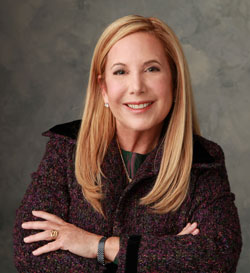Quoting Scalia, ABA president says Second Amendment rights have limits

Photo of Laurel Bellows by Marc Hauser.
In congressional testimony submitted Wednesday, ABA President Laurel Bellows said the ABA has a long history of supporting efforts to reduce gun violence. The association’s first call for more careful regulation of firearms sales: after the assassination of President Kennedy.
Since then, the ABA’s policy-making House of Delegates has approved more than a dozen policy resolutions that are intended to reduce gun violence, Bellows says in written comments (PDF) prepared for a Senate Judiciary Committee hearing today. “The ABA continues to believe that our nation’s laws can be significantly strengthened by taking reasonable, commonsense steps that do not violate the constitutional right to bear arms as articulated by the U.S. Supreme Court in the landmark decision in District of Columbia v. Heller,” Bellows writes.
The Second Amendment doesn’t protect military-style assault weapons, Bellows says, and she quotes Justice Antonin Scalia to back the assertion. Scalia wrote Heller, which found that the Second Amendment protects the right to keep handguns for protection within the home.
Some maintain that the Second Amendment should prevent regulation of assault weapons and high-capacity clips, Bellows notes in her remarks. The ABA, on the other hand, believes that “the individual right to bear arms under the Second Amendment must be understood to have some limits.” Second Amendment rights, she said, must be balanced against the need to protect citizens from especially dangerous weapons. Bellows says this recognition has supported regulation of fully automatic “machine guns” since the 1930s.
She quotes a portion from Scalia’s Heller opinion in which he interprets a 1939 U.S. Supreme Court decision as giving Second Amendment protection to weapons “in common use at the time” of its adoption. According to Scalia, “We think that limitation is fairly supported by the historical tradition of prohibiting the carrying of ‘dangerous and unusual weapons.’ ”
After referring to the Scalia quote, Bellows writes that there is no constitutional ban on regulation of assault weapons and high-capacity ammunition magazines. “The muskets of the 18th century and other single-shot weapons have little in common with the military-style assault weapons today and the 100-round ammunition drum that was used at a movie theater in Aurora, Colorado,” she says in her remarks to the Senate Judiciary Committee. “These are unusually dangerous weapons, which the government may regulate under the Second Amendment and the Heller decision. We believe the government has a duty to do so to protect the common good—specifically, the safety of American citizens.”
The ABA supports legislation introduced by Sen. Dianne Feinstein that would limit the future sale and transfer of assault weapons and ammunition devices that hold more than 10 bullets. “The availability of assault weapons and high-capacity clips should be limited to the U.S. military, the National Guard and law enforcement,” Bellows writes. The proposed law grandfathers into legal status assault weapons currently owned, but requires more careful regulation of the weapons’ transfer and sale, according to Bellows’ description of the bill. High-capacity ammunition clips would also be grandfathered under the bill, but they could not be transferred or sold.
Last week, Bellows wrote a letter to Sen. Dianne Feinstein expressing ABA support for the legislation. An ABAJournal.com story on the letter published last Thursday had generated more than 350 comments as of Jan. 30.
In her testimony, Bellows also urges the committee to:
• Strengthen the system of background checks for gun purchases.
• Fight gun trafficking through stronger laws.



